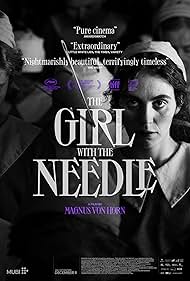Copenhagen 1919: A young factory worker is unemployed and pregnant
She meets Dagmar, who runs an underground adoption agency. A strong bond develops, but her world collapses when she discovers the shocking truth behind her work. Denmark's official submission for Best International Feature Film; 97th Academy Awards 2025. It's the final days of the Great War, and Caroline is barely surviving by working in a factory.
When was the era’s rampant drug use portrayed so candidly?
She believes she's a widow because her husband disappeared during the war (even though Denmark didn't actually participate), but she doesn't receive widow's benefits because he's not listed as deceased. A lot happens during the film, and I don't want to go into spoilers, so I won't go into the plot, except to highlight something that doesn't play as big a role in the film as you might expect. While the second half of the film does get a lot of attention, the real value of the film, in my opinion, is the sense of reality that Carolina’s story brings to the table. When was the last time someone in a film tried to convince a potential tenant to take an apartment by telling them they could have running water for two whole hours a day (from ten to noon, which might not be a great deal since most people would be working during those hours)?
Although Dagmar is the main character, the film is clearly about Carolina and her struggles
Even what Dagmar does was relatively commonplace, although I’ll admit that at this point the trend was on the decline and it didn’t happen as much as before. In fact, I might have enjoyed the film more if the marketing had been different and Dagmar hadn’t been raised to be a hopeful character. On the other hand, it’s hard to say how I would have felt seeing the name Dagmar Overby on the door if I hadn’t known beforehand that this real-life person was being used in the film. (It should be noted that the film is inspired by real-life events, not based on them, so they try to keep some distance from the real Dagmar).
I like the look of the film
I think some viewers will have a hard time sympathizing with Caroline, because sometimes it feels like she makes the right decision just a little too late. At the same time, there’s not much time or opportunity for ethics when you’re just trying to survive in a world where the odds are stacked against you. On the other hand, even though we know that the hope she’s given would be futile in this world, we still understand why she goes for it. It’s black and white, and the entire city seems rundown and barely holding up.
Have things really changed that much?
It reminds us of the lack of interest in, or even contempt for, the well-being of the working poor. Of course, all art is in a way a mirror of the time in which it was created, but it seems easier to see the similarities here.




 25/34
25/34